Entrepreneurship: Ventures, Economy, and Mindset in the UK Report
VerifiedAdded on 2020/12/09
|15
|4491
|112
Report
AI Summary
This report delves into the realm of entrepreneurship and its significance within the UK economy. It begins by defining entrepreneurship and exploring various types of entrepreneurial ventures, such as serial entrepreneurs, intrapreneurs, and owner-managers, while relating them to different typologies like lifestyle, growth, and social entrepreneurship. The report then contrasts and compares these ventures, highlighting their similarities and differences. Furthermore, it investigates the impact of small businesses on the UK economy, examining their roles in major industries and classifying organizations by size (micro, small, and medium). The report also addresses how businesses protect intellectual property rights. Finally, it emphasizes the importance of small businesses and startups in fostering the growth of the social economy in the UK, outlining their contributions to job creation, economic stability, and the development of the social economy.
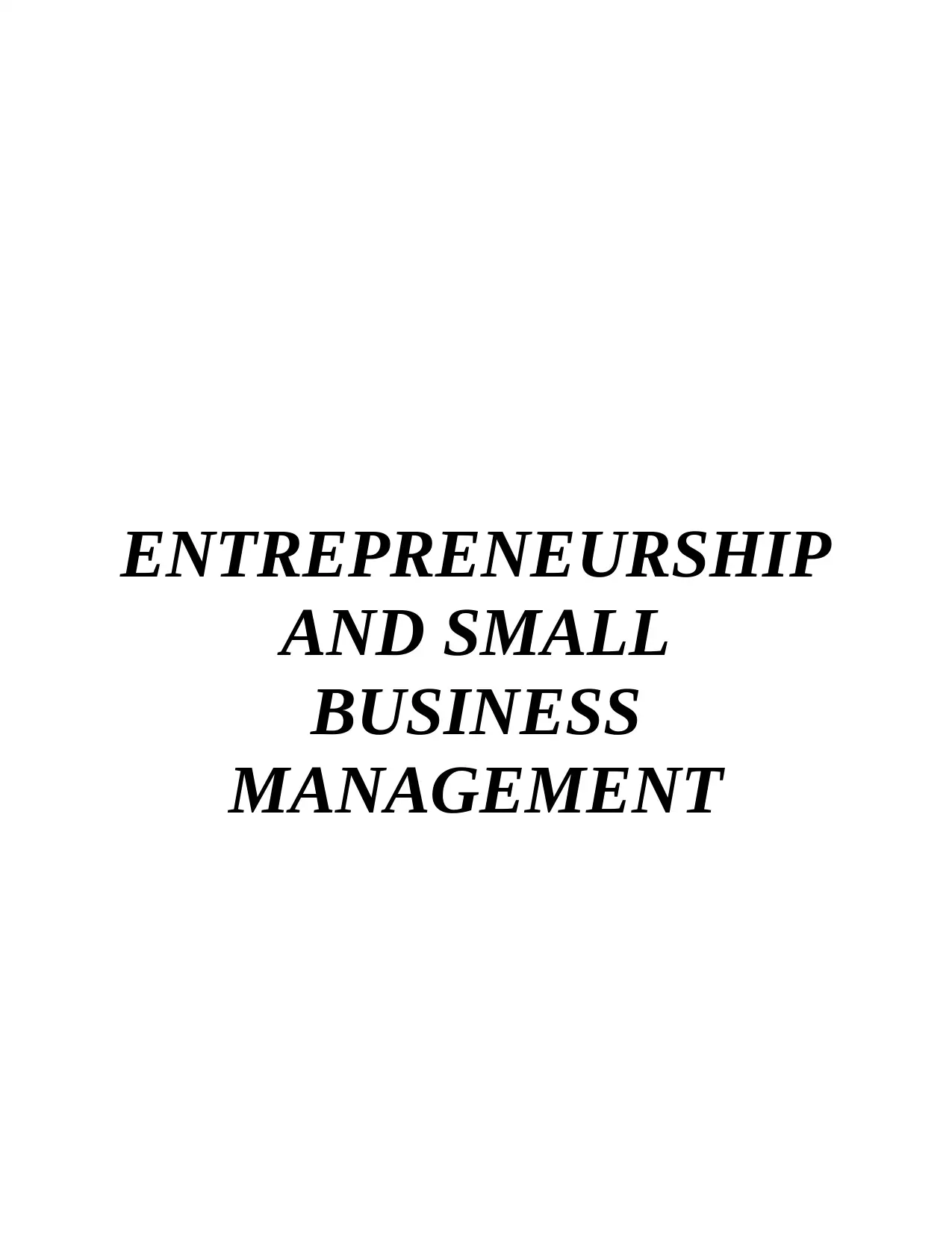
ENTREPRENEURSHIP
AND SMALL
BUSINESS
MANAGEMENT
AND SMALL
BUSINESS
MANAGEMENT
Paraphrase This Document
Need a fresh take? Get an instant paraphrase of this document with our AI Paraphraser
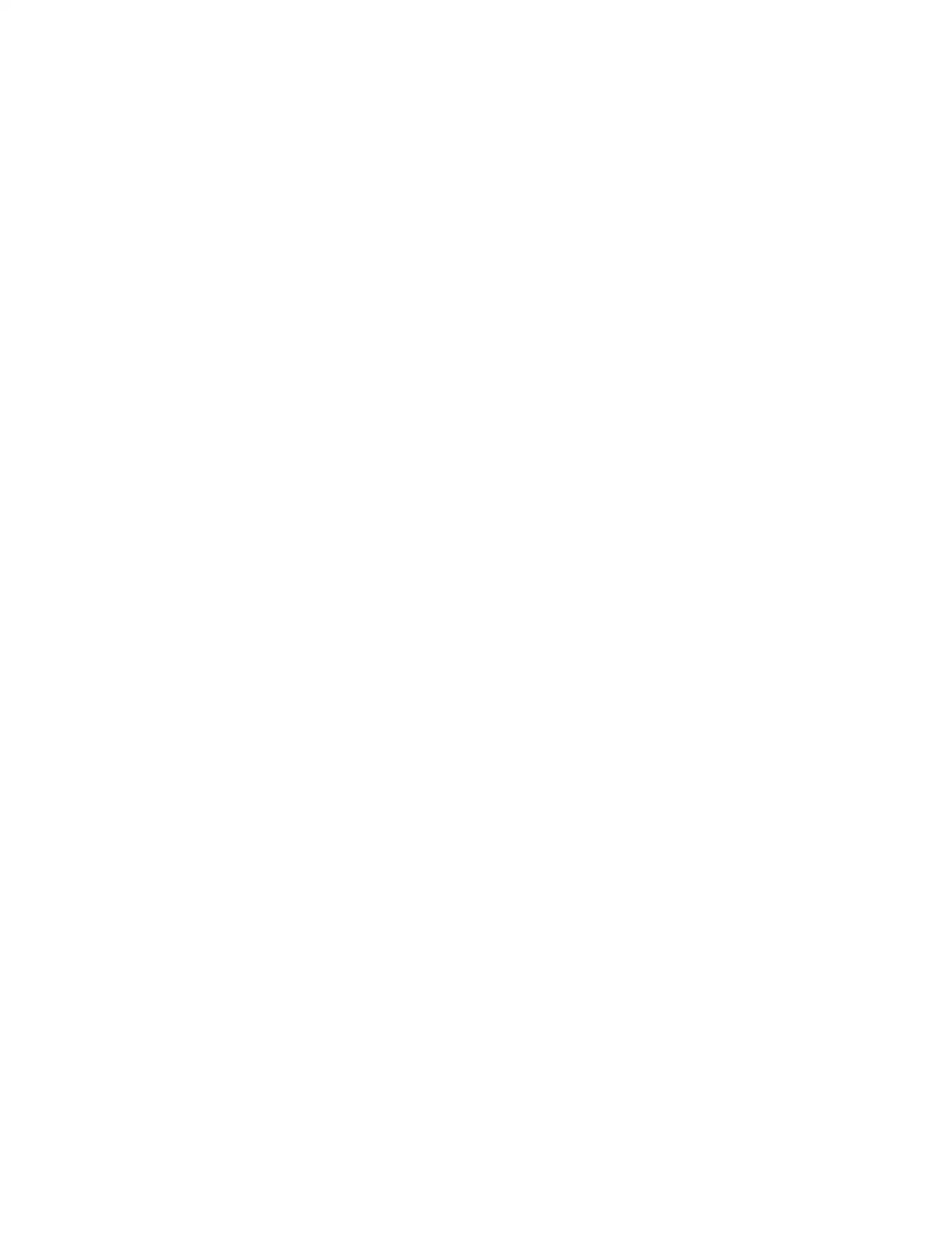
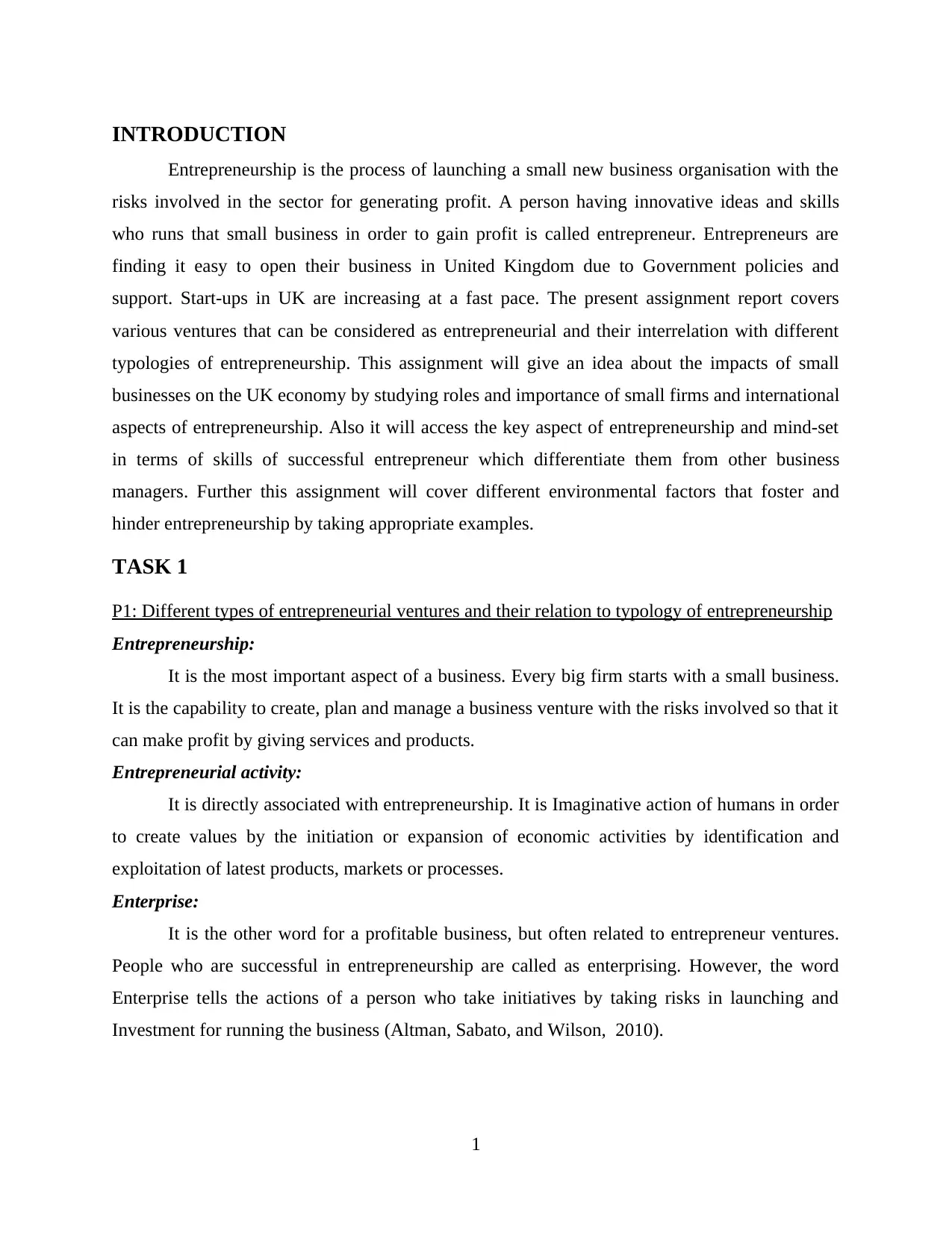
INTRODUCTION
Entrepreneurship is the process of launching a small new business organisation with the
risks involved in the sector for generating profit. A person having innovative ideas and skills
who runs that small business in order to gain profit is called entrepreneur. Entrepreneurs are
finding it easy to open their business in United Kingdom due to Government policies and
support. Start-ups in UK are increasing at a fast pace. The present assignment report covers
various ventures that can be considered as entrepreneurial and their interrelation with different
typologies of entrepreneurship. This assignment will give an idea about the impacts of small
businesses on the UK economy by studying roles and importance of small firms and international
aspects of entrepreneurship. Also it will access the key aspect of entrepreneurship and mind-set
in terms of skills of successful entrepreneur which differentiate them from other business
managers. Further this assignment will cover different environmental factors that foster and
hinder entrepreneurship by taking appropriate examples.
TASK 1
P1: Different types of entrepreneurial ventures and their relation to typology of entrepreneurship
Entrepreneurship:
It is the most important aspect of a business. Every big firm starts with a small business.
It is the capability to create, plan and manage a business venture with the risks involved so that it
can make profit by giving services and products.
Entrepreneurial activity:
It is directly associated with entrepreneurship. It is Imaginative action of humans in order
to create values by the initiation or expansion of economic activities by identification and
exploitation of latest products, markets or processes.
Enterprise:
It is the other word for a profitable business, but often related to entrepreneur ventures.
People who are successful in entrepreneurship are called as enterprising. However, the word
Enterprise tells the actions of a person who take initiatives by taking risks in launching and
Investment for running the business (Altman, Sabato, and Wilson, 2010).
1
Entrepreneurship is the process of launching a small new business organisation with the
risks involved in the sector for generating profit. A person having innovative ideas and skills
who runs that small business in order to gain profit is called entrepreneur. Entrepreneurs are
finding it easy to open their business in United Kingdom due to Government policies and
support. Start-ups in UK are increasing at a fast pace. The present assignment report covers
various ventures that can be considered as entrepreneurial and their interrelation with different
typologies of entrepreneurship. This assignment will give an idea about the impacts of small
businesses on the UK economy by studying roles and importance of small firms and international
aspects of entrepreneurship. Also it will access the key aspect of entrepreneurship and mind-set
in terms of skills of successful entrepreneur which differentiate them from other business
managers. Further this assignment will cover different environmental factors that foster and
hinder entrepreneurship by taking appropriate examples.
TASK 1
P1: Different types of entrepreneurial ventures and their relation to typology of entrepreneurship
Entrepreneurship:
It is the most important aspect of a business. Every big firm starts with a small business.
It is the capability to create, plan and manage a business venture with the risks involved so that it
can make profit by giving services and products.
Entrepreneurial activity:
It is directly associated with entrepreneurship. It is Imaginative action of humans in order
to create values by the initiation or expansion of economic activities by identification and
exploitation of latest products, markets or processes.
Enterprise:
It is the other word for a profitable business, but often related to entrepreneur ventures.
People who are successful in entrepreneurship are called as enterprising. However, the word
Enterprise tells the actions of a person who take initiatives by taking risks in launching and
Investment for running the business (Altman, Sabato, and Wilson, 2010).
1
⊘ This is a preview!⊘
Do you want full access?
Subscribe today to unlock all pages.

Trusted by 1+ million students worldwide
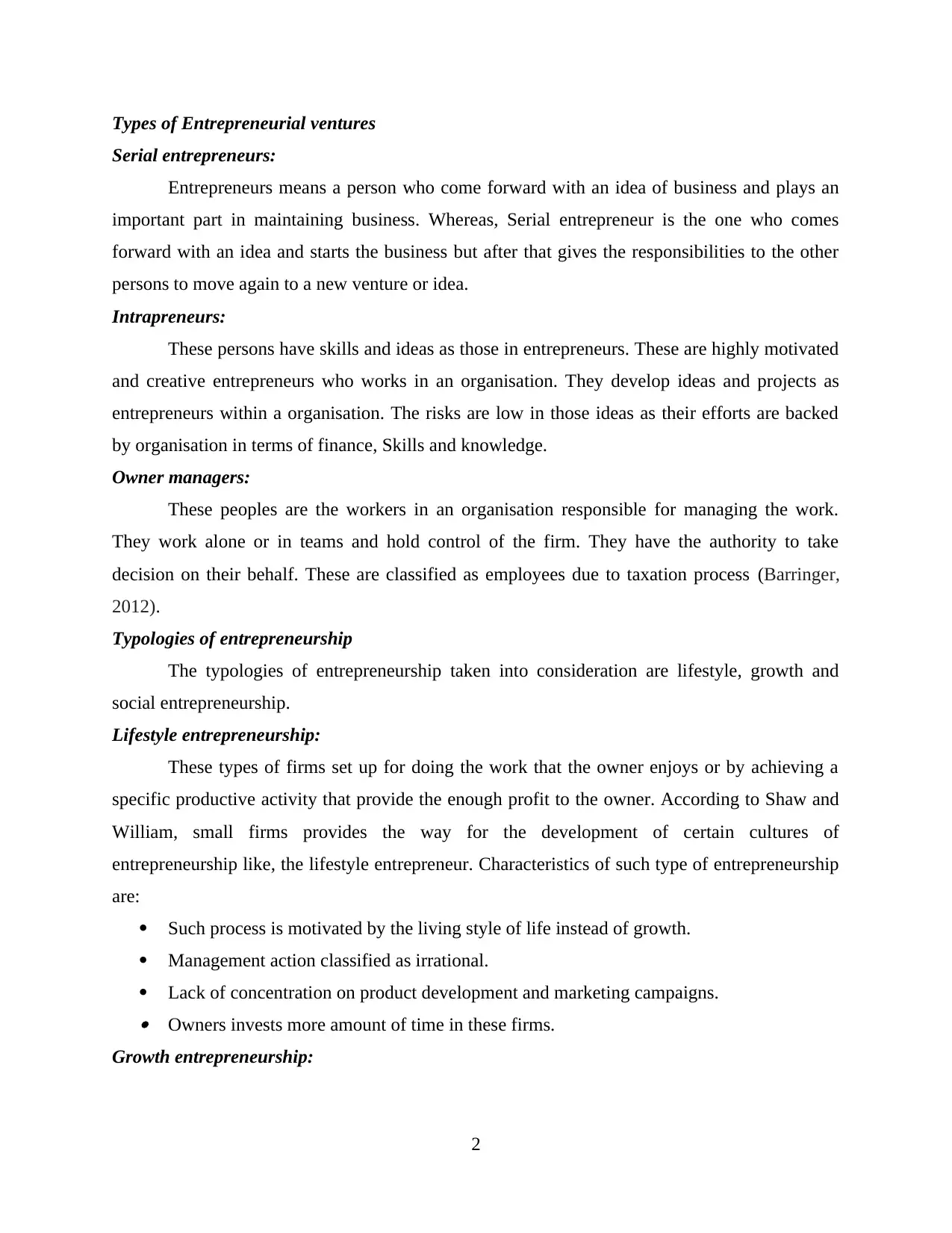
Types of Entrepreneurial ventures
Serial entrepreneurs:
Entrepreneurs means a person who come forward with an idea of business and plays an
important part in maintaining business. Whereas, Serial entrepreneur is the one who comes
forward with an idea and starts the business but after that gives the responsibilities to the other
persons to move again to a new venture or idea.
Intrapreneurs:
These persons have skills and ideas as those in entrepreneurs. These are highly motivated
and creative entrepreneurs who works in an organisation. They develop ideas and projects as
entrepreneurs within a organisation. The risks are low in those ideas as their efforts are backed
by organisation in terms of finance, Skills and knowledge.
Owner managers:
These peoples are the workers in an organisation responsible for managing the work.
They work alone or in teams and hold control of the firm. They have the authority to take
decision on their behalf. These are classified as employees due to taxation process (Barringer,
2012).
Typologies of entrepreneurship
The typologies of entrepreneurship taken into consideration are lifestyle, growth and
social entrepreneurship.
Lifestyle entrepreneurship:
These types of firms set up for doing the work that the owner enjoys or by achieving a
specific productive activity that provide the enough profit to the owner. According to Shaw and
William, small firms provides the way for the development of certain cultures of
entrepreneurship like, the lifestyle entrepreneur. Characteristics of such type of entrepreneurship
are:
Such process is motivated by the living style of life instead of growth.
Management action classified as irrational.
Lack of concentration on product development and marketing campaigns. Owners invests more amount of time in these firms.
Growth entrepreneurship:
2
Serial entrepreneurs:
Entrepreneurs means a person who come forward with an idea of business and plays an
important part in maintaining business. Whereas, Serial entrepreneur is the one who comes
forward with an idea and starts the business but after that gives the responsibilities to the other
persons to move again to a new venture or idea.
Intrapreneurs:
These persons have skills and ideas as those in entrepreneurs. These are highly motivated
and creative entrepreneurs who works in an organisation. They develop ideas and projects as
entrepreneurs within a organisation. The risks are low in those ideas as their efforts are backed
by organisation in terms of finance, Skills and knowledge.
Owner managers:
These peoples are the workers in an organisation responsible for managing the work.
They work alone or in teams and hold control of the firm. They have the authority to take
decision on their behalf. These are classified as employees due to taxation process (Barringer,
2012).
Typologies of entrepreneurship
The typologies of entrepreneurship taken into consideration are lifestyle, growth and
social entrepreneurship.
Lifestyle entrepreneurship:
These types of firms set up for doing the work that the owner enjoys or by achieving a
specific productive activity that provide the enough profit to the owner. According to Shaw and
William, small firms provides the way for the development of certain cultures of
entrepreneurship like, the lifestyle entrepreneur. Characteristics of such type of entrepreneurship
are:
Such process is motivated by the living style of life instead of growth.
Management action classified as irrational.
Lack of concentration on product development and marketing campaigns. Owners invests more amount of time in these firms.
Growth entrepreneurship:
2
Paraphrase This Document
Need a fresh take? Get an instant paraphrase of this document with our AI Paraphraser
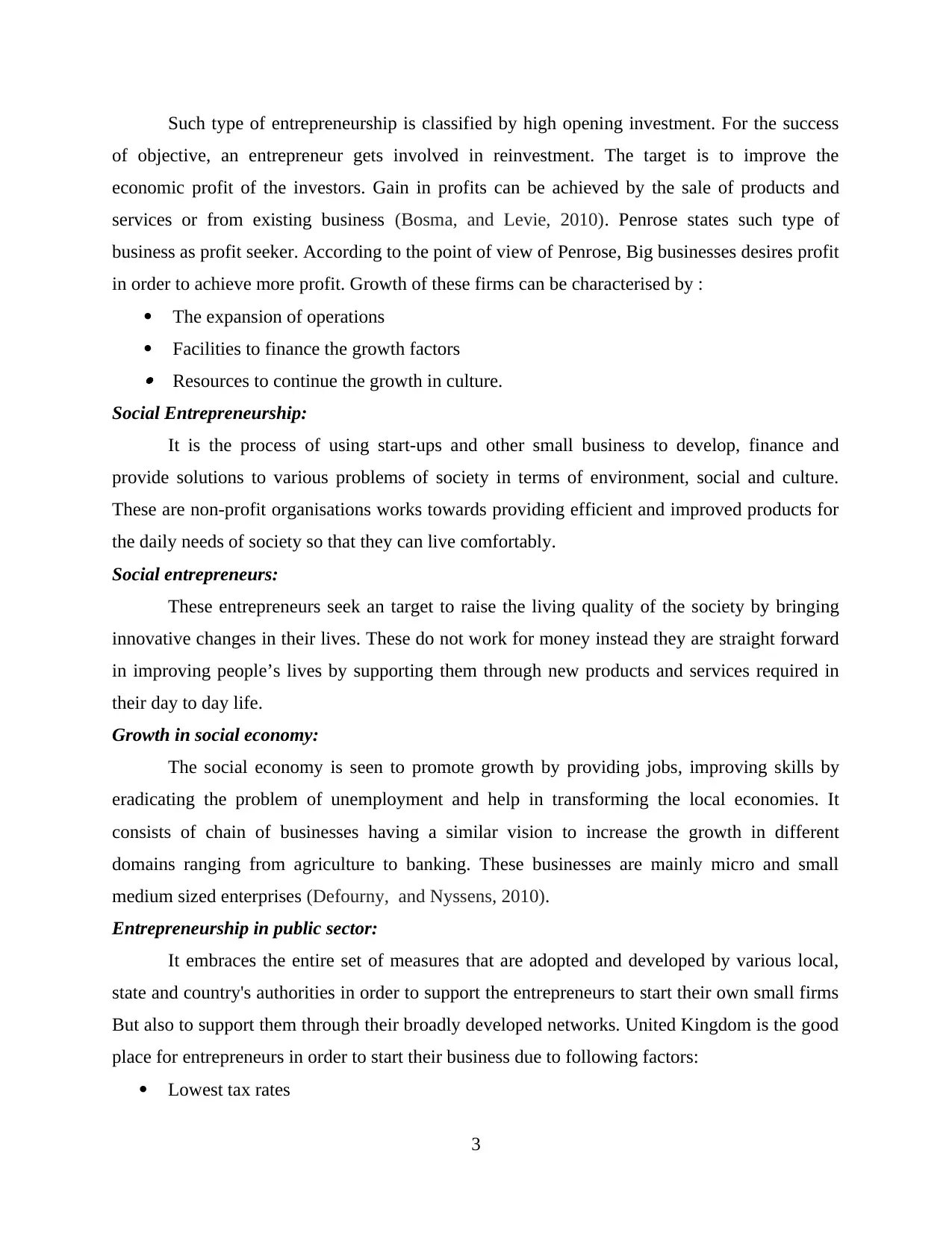
Such type of entrepreneurship is classified by high opening investment. For the success
of objective, an entrepreneur gets involved in reinvestment. The target is to improve the
economic profit of the investors. Gain in profits can be achieved by the sale of products and
services or from existing business (Bosma, and Levie, 2010). Penrose states such type of
business as profit seeker. According to the point of view of Penrose, Big businesses desires profit
in order to achieve more profit. Growth of these firms can be characterised by :
The expansion of operations
Facilities to finance the growth factors Resources to continue the growth in culture.
Social Entrepreneurship:
It is the process of using start-ups and other small business to develop, finance and
provide solutions to various problems of society in terms of environment, social and culture.
These are non-profit organisations works towards providing efficient and improved products for
the daily needs of society so that they can live comfortably.
Social entrepreneurs:
These entrepreneurs seek an target to raise the living quality of the society by bringing
innovative changes in their lives. These do not work for money instead they are straight forward
in improving people’s lives by supporting them through new products and services required in
their day to day life.
Growth in social economy:
The social economy is seen to promote growth by providing jobs, improving skills by
eradicating the problem of unemployment and help in transforming the local economies. It
consists of chain of businesses having a similar vision to increase the growth in different
domains ranging from agriculture to banking. These businesses are mainly micro and small
medium sized enterprises (Defourny, and Nyssens, 2010).
Entrepreneurship in public sector:
It embraces the entire set of measures that are adopted and developed by various local,
state and country's authorities in order to support the entrepreneurs to start their own small firms
But also to support them through their broadly developed networks. United Kingdom is the good
place for entrepreneurs in order to start their business due to following factors:
Lowest tax rates
3
of objective, an entrepreneur gets involved in reinvestment. The target is to improve the
economic profit of the investors. Gain in profits can be achieved by the sale of products and
services or from existing business (Bosma, and Levie, 2010). Penrose states such type of
business as profit seeker. According to the point of view of Penrose, Big businesses desires profit
in order to achieve more profit. Growth of these firms can be characterised by :
The expansion of operations
Facilities to finance the growth factors Resources to continue the growth in culture.
Social Entrepreneurship:
It is the process of using start-ups and other small business to develop, finance and
provide solutions to various problems of society in terms of environment, social and culture.
These are non-profit organisations works towards providing efficient and improved products for
the daily needs of society so that they can live comfortably.
Social entrepreneurs:
These entrepreneurs seek an target to raise the living quality of the society by bringing
innovative changes in their lives. These do not work for money instead they are straight forward
in improving people’s lives by supporting them through new products and services required in
their day to day life.
Growth in social economy:
The social economy is seen to promote growth by providing jobs, improving skills by
eradicating the problem of unemployment and help in transforming the local economies. It
consists of chain of businesses having a similar vision to increase the growth in different
domains ranging from agriculture to banking. These businesses are mainly micro and small
medium sized enterprises (Defourny, and Nyssens, 2010).
Entrepreneurship in public sector:
It embraces the entire set of measures that are adopted and developed by various local,
state and country's authorities in order to support the entrepreneurs to start their own small firms
But also to support them through their broadly developed networks. United Kingdom is the good
place for entrepreneurs in order to start their business due to following factors:
Lowest tax rates
3
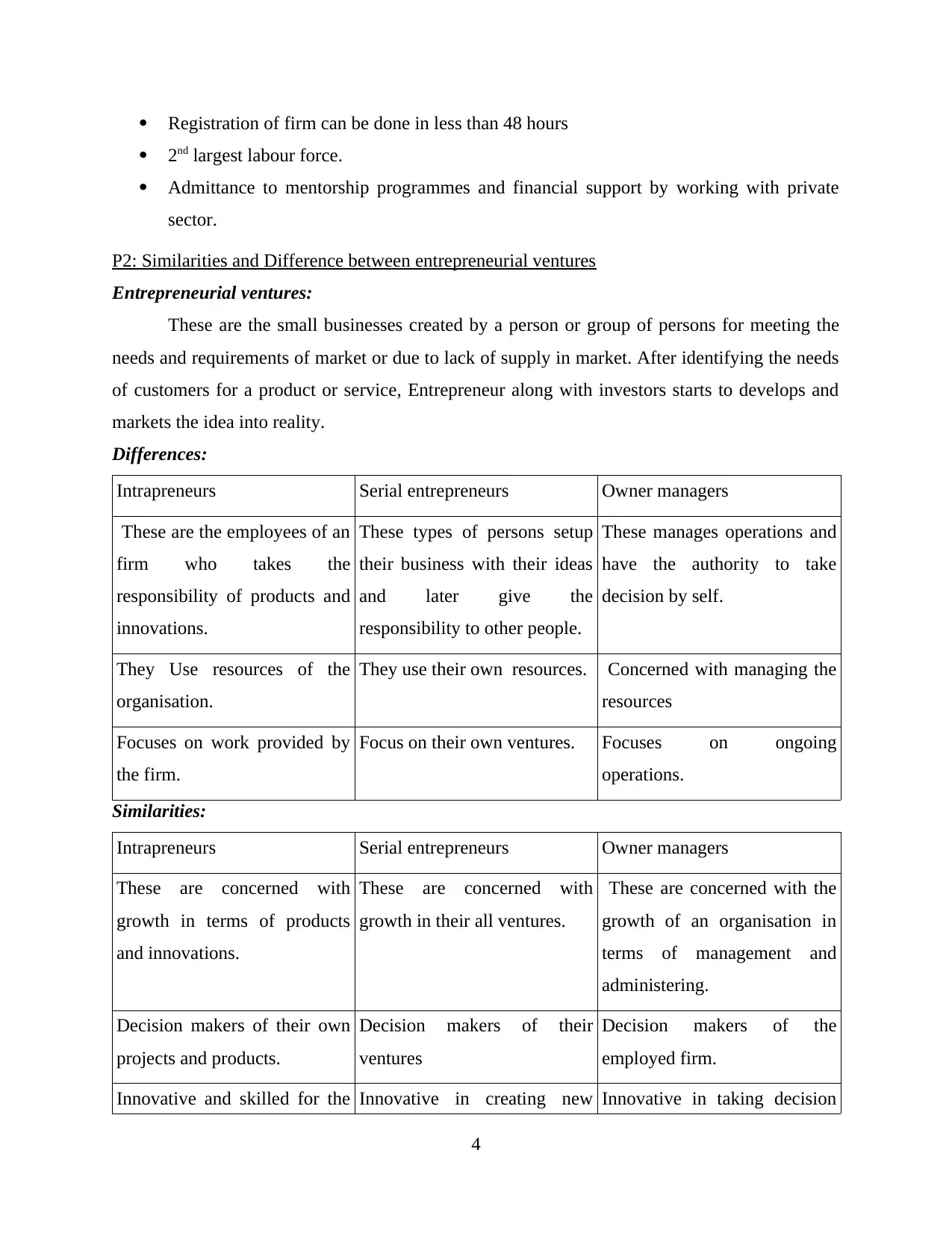
Registration of firm can be done in less than 48 hours
2nd largest labour force.
Admittance to mentorship programmes and financial support by working with private
sector.
P2: Similarities and Difference between entrepreneurial ventures
Entrepreneurial ventures:
These are the small businesses created by a person or group of persons for meeting the
needs and requirements of market or due to lack of supply in market. After identifying the needs
of customers for a product or service, Entrepreneur along with investors starts to develops and
markets the idea into reality.
Differences:
Intrapreneurs Serial entrepreneurs Owner managers
These are the employees of an
firm who takes the
responsibility of products and
innovations.
These types of persons setup
their business with their ideas
and later give the
responsibility to other people.
These manages operations and
have the authority to take
decision by self.
They Use resources of the
organisation.
They use their own resources. Concerned with managing the
resources
Focuses on work provided by
the firm.
Focus on their own ventures. Focuses on ongoing
operations.
Similarities:
Intrapreneurs Serial entrepreneurs Owner managers
These are concerned with
growth in terms of products
and innovations.
These are concerned with
growth in their all ventures.
These are concerned with the
growth of an organisation in
terms of management and
administering.
Decision makers of their own
projects and products.
Decision makers of their
ventures
Decision makers of the
employed firm.
Innovative and skilled for the Innovative in creating new Innovative in taking decision
4
2nd largest labour force.
Admittance to mentorship programmes and financial support by working with private
sector.
P2: Similarities and Difference between entrepreneurial ventures
Entrepreneurial ventures:
These are the small businesses created by a person or group of persons for meeting the
needs and requirements of market or due to lack of supply in market. After identifying the needs
of customers for a product or service, Entrepreneur along with investors starts to develops and
markets the idea into reality.
Differences:
Intrapreneurs Serial entrepreneurs Owner managers
These are the employees of an
firm who takes the
responsibility of products and
innovations.
These types of persons setup
their business with their ideas
and later give the
responsibility to other people.
These manages operations and
have the authority to take
decision by self.
They Use resources of the
organisation.
They use their own resources. Concerned with managing the
resources
Focuses on work provided by
the firm.
Focus on their own ventures. Focuses on ongoing
operations.
Similarities:
Intrapreneurs Serial entrepreneurs Owner managers
These are concerned with
growth in terms of products
and innovations.
These are concerned with
growth in their all ventures.
These are concerned with the
growth of an organisation in
terms of management and
administering.
Decision makers of their own
projects and products.
Decision makers of their
ventures
Decision makers of the
employed firm.
Innovative and skilled for the Innovative in creating new Innovative in taking decision
4
⊘ This is a preview!⊘
Do you want full access?
Subscribe today to unlock all pages.

Trusted by 1+ million students worldwide

development of product. ventures for the benefit of firm and
employees.
TASK 2
P3: Impact of small business on the economy
In 2017, There was a record number of 5.7 million business in UK economy. In them
over 99% are small and medium sized business. The number of small business is growing faster
than the total number of business from 2010 to 2014. Big industries in UK are manufacturing,
retail and repair of motor vehicles (Drucker, 2014). Small businesses are at the centre of these
largest industries in UK. Four types of organisations are described below:
Micro organisations:
It is defined as the small firms employing of nine or few persons with an very low annual
turnover. Their plant and machinery does not costs too much. Many micro firms are basically
family business employing 2 to 3 employees.
Small organisations:
It is a privately owned business of 10 to 49 employees and low annual turnover than
regular sized firms. These are classified based on annual turnover, sales and assets etc. Their
annual revenue doesn't cross £ 2 million and the cost of plants and machinery does not go
beyond £ 2.5 million.
Medium organisations:
These consists of 50 to 249 employees with an annual turnover of under £ 25.9 million.
These type of firms targets long run goals and objectives for higher profits in a fixed time.
5
employees.
TASK 2
P3: Impact of small business on the economy
In 2017, There was a record number of 5.7 million business in UK economy. In them
over 99% are small and medium sized business. The number of small business is growing faster
than the total number of business from 2010 to 2014. Big industries in UK are manufacturing,
retail and repair of motor vehicles (Drucker, 2014). Small businesses are at the centre of these
largest industries in UK. Four types of organisations are described below:
Micro organisations:
It is defined as the small firms employing of nine or few persons with an very low annual
turnover. Their plant and machinery does not costs too much. Many micro firms are basically
family business employing 2 to 3 employees.
Small organisations:
It is a privately owned business of 10 to 49 employees and low annual turnover than
regular sized firms. These are classified based on annual turnover, sales and assets etc. Their
annual revenue doesn't cross £ 2 million and the cost of plants and machinery does not go
beyond £ 2.5 million.
Medium organisations:
These consists of 50 to 249 employees with an annual turnover of under £ 25.9 million.
These type of firms targets long run goals and objectives for higher profits in a fixed time.
5
Paraphrase This Document
Need a fresh take? Get an instant paraphrase of this document with our AI Paraphraser
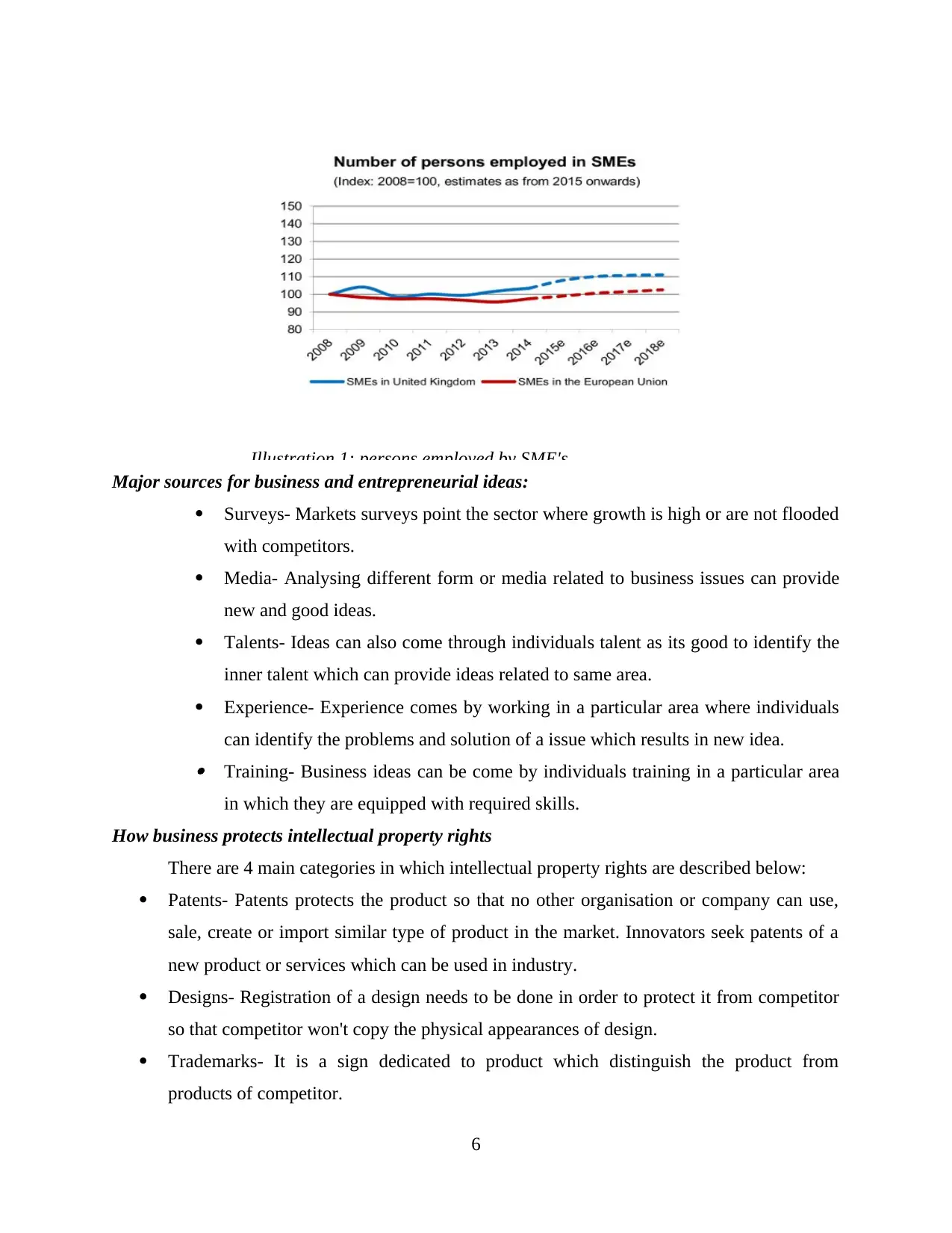
Major sources for business and entrepreneurial ideas:
Surveys- Markets surveys point the sector where growth is high or are not flooded
with competitors.
Media- Analysing different form or media related to business issues can provide
new and good ideas.
Talents- Ideas can also come through individuals talent as its good to identify the
inner talent which can provide ideas related to same area.
Experience- Experience comes by working in a particular area where individuals
can identify the problems and solution of a issue which results in new idea.
Training- Business ideas can be come by individuals training in a particular area
in which they are equipped with required skills.
How business protects intellectual property rights
There are 4 main categories in which intellectual property rights are described below:
Patents- Patents protects the product so that no other organisation or company can use,
sale, create or import similar type of product in the market. Innovators seek patents of a
new product or services which can be used in industry.
Designs- Registration of a design needs to be done in order to protect it from competitor
so that competitor won't copy the physical appearances of design.
Trademarks- It is a sign dedicated to product which distinguish the product from
products of competitor.
6
Illustration 1: persons employed by SME's
Surveys- Markets surveys point the sector where growth is high or are not flooded
with competitors.
Media- Analysing different form or media related to business issues can provide
new and good ideas.
Talents- Ideas can also come through individuals talent as its good to identify the
inner talent which can provide ideas related to same area.
Experience- Experience comes by working in a particular area where individuals
can identify the problems and solution of a issue which results in new idea.
Training- Business ideas can be come by individuals training in a particular area
in which they are equipped with required skills.
How business protects intellectual property rights
There are 4 main categories in which intellectual property rights are described below:
Patents- Patents protects the product so that no other organisation or company can use,
sale, create or import similar type of product in the market. Innovators seek patents of a
new product or services which can be used in industry.
Designs- Registration of a design needs to be done in order to protect it from competitor
so that competitor won't copy the physical appearances of design.
Trademarks- It is a sign dedicated to product which distinguish the product from
products of competitor.
6
Illustration 1: persons employed by SME's

Copyrights- It provide the rights to creator for a product. It helps in determining how and
where the original product can be used by others individuals and organisations.
P4 Explain the importance of small business and business start-ups to the growth of the social
economy
Economy of UK mainly based upon small business entities and start-ups. These
businesses are considered keystone of UK economy (George, and Bock, 2011). As per the data
issued by confederation of British Industry small and medium scale business are making 99.9%
of private sector subject to 60% of private sector jobs. According to this report there are 4.9
million businesses are being operated in the UK. The economy of the UK was mainly adjusted
with full potential subject to £20 billion economy by 2020. Small business has contributed in
economy of UK by creating jobs and maintaining the stability in formation and control. It is
estimated that SMEs are set to contribute £241 billion to the economy by 2025. the growth and
development for various contributed aspects are considered in British economy to grow the small
and medium scale sector of organisation (Kirzner, 2015).
Significance of small business and start ups developed of social economy
UK government evaluated that main portion of small business is reduced due to diverse
exchange limits and variations. To defeat from the impact of sudden change in economy small
business and start ups are adopting flexible strategic planning and process. To abolish
independent organisational performance SMEs adopted the concept of sustainable change.
As per the data given in it is analysed that the social enterprises in UK are contributing
approx 28% of worth and assisting regional members. Only 16% of social business are getting
positive aspect in terms of providing services as hospitality, education and IT services. It is
require to expand entrepreneurial business for work, expulsion of unemployment, decrement of
poverty, reducing the gap between high income and lower income groups, Improvement in
exchange of UK and so on. Such enhancement in various fields has significant effect on the
improvement of society and economy. Some other imperative of new movement and
independent ventures are made reference as follows:
Job opportunities: New business ventures and independent business operations
contributes an enormous role in generating jobs. Placement of skilled and professional
manpower in newly established organisation not only support the economy by financially but
also helps to improve the living structure of society. Job opportunities brings sustainable
7
where the original product can be used by others individuals and organisations.
P4 Explain the importance of small business and business start-ups to the growth of the social
economy
Economy of UK mainly based upon small business entities and start-ups. These
businesses are considered keystone of UK economy (George, and Bock, 2011). As per the data
issued by confederation of British Industry small and medium scale business are making 99.9%
of private sector subject to 60% of private sector jobs. According to this report there are 4.9
million businesses are being operated in the UK. The economy of the UK was mainly adjusted
with full potential subject to £20 billion economy by 2020. Small business has contributed in
economy of UK by creating jobs and maintaining the stability in formation and control. It is
estimated that SMEs are set to contribute £241 billion to the economy by 2025. the growth and
development for various contributed aspects are considered in British economy to grow the small
and medium scale sector of organisation (Kirzner, 2015).
Significance of small business and start ups developed of social economy
UK government evaluated that main portion of small business is reduced due to diverse
exchange limits and variations. To defeat from the impact of sudden change in economy small
business and start ups are adopting flexible strategic planning and process. To abolish
independent organisational performance SMEs adopted the concept of sustainable change.
As per the data given in it is analysed that the social enterprises in UK are contributing
approx 28% of worth and assisting regional members. Only 16% of social business are getting
positive aspect in terms of providing services as hospitality, education and IT services. It is
require to expand entrepreneurial business for work, expulsion of unemployment, decrement of
poverty, reducing the gap between high income and lower income groups, Improvement in
exchange of UK and so on. Such enhancement in various fields has significant effect on the
improvement of society and economy. Some other imperative of new movement and
independent ventures are made reference as follows:
Job opportunities: New business ventures and independent business operations
contributes an enormous role in generating jobs. Placement of skilled and professional
manpower in newly established organisation not only support the economy by financially but
also helps to improve the living structure of society. Job opportunities brings sustainable
7
⊘ This is a preview!⊘
Do you want full access?
Subscribe today to unlock all pages.

Trusted by 1+ million students worldwide

development subject to society. Extensive number of growth statistics were inferred by society
and people subject to decrease in poverty, reduction of difference between income groups and
improvement in living standards (Light, 2011).
Monetary assistance: Small business and start ups played crucial role in recession
duration. To enhance mechanical division for small business, government planed strategies that
encouraged people to setup new business with creative vision and ideas. As this will gives vital
monetary help to government in order to met expenses and further investment. It is additionally
utilized for sustainable growth.
Building strong base of trading in UK: Structure of small business and start ups get
impacted after political changes in UK economy. Trading business of UK thoroughly relies on
European Union. However, after the impact of Brexit, various start ups project had to hold till re
formation process. To defeat from such impact plans were made by government that enhanced
the structure of global business. Because of increment in number of new ventures number of
fares are also increment which enhanced the image of UK in global market.
Enhancement in standardized savings: Now the UK government has sole control on
enterprises and have the ability to direct their operations and management at their own terms and
conditions. This outcomes in provision of more government disability to nearby businesses and
individual of society were analysed various nature of items and administrations for structural
change.
TASK 3
P5 Determine the characteristics traits and skills for successful entrepreneurs that differentiate
them from other business managers
There is a unmeasurable efforts and handwork remain associated with every successful
business entity. Imperative abilities and attributes that motivates entrepreneurs to accomplish
their objectives within desired duration. Such abilities encourages them to design about their
future exercises and make systems as per that which functions as directing component for
representatives. The two effective business visionaries who changed the global image of start-
ups with their development and managerial abilities are Bill Gates and Mark Zuckerberg. Both
the business persons sustain remarkable abilities and information in their profession that build
them unique in relation to other typical business supervisors. Enthusiasm level was record at
8
and people subject to decrease in poverty, reduction of difference between income groups and
improvement in living standards (Light, 2011).
Monetary assistance: Small business and start ups played crucial role in recession
duration. To enhance mechanical division for small business, government planed strategies that
encouraged people to setup new business with creative vision and ideas. As this will gives vital
monetary help to government in order to met expenses and further investment. It is additionally
utilized for sustainable growth.
Building strong base of trading in UK: Structure of small business and start ups get
impacted after political changes in UK economy. Trading business of UK thoroughly relies on
European Union. However, after the impact of Brexit, various start ups project had to hold till re
formation process. To defeat from such impact plans were made by government that enhanced
the structure of global business. Because of increment in number of new ventures number of
fares are also increment which enhanced the image of UK in global market.
Enhancement in standardized savings: Now the UK government has sole control on
enterprises and have the ability to direct their operations and management at their own terms and
conditions. This outcomes in provision of more government disability to nearby businesses and
individual of society were analysed various nature of items and administrations for structural
change.
TASK 3
P5 Determine the characteristics traits and skills for successful entrepreneurs that differentiate
them from other business managers
There is a unmeasurable efforts and handwork remain associated with every successful
business entity. Imperative abilities and attributes that motivates entrepreneurs to accomplish
their objectives within desired duration. Such abilities encourages them to design about their
future exercises and make systems as per that which functions as directing component for
representatives. The two effective business visionaries who changed the global image of start-
ups with their development and managerial abilities are Bill Gates and Mark Zuckerberg. Both
the business persons sustain remarkable abilities and information in their profession that build
them unique in relation to other typical business supervisors. Enthusiasm level was record at
8
Paraphrase This Document
Need a fresh take? Get an instant paraphrase of this document with our AI Paraphraser

high level among both the entrepreneurs. They have potential to compete with challenges and
strive to accomplish objectives. The critical attributes that enhanced their entrepreneurial skills
are as follows:
Risk handling: Analysing the risk factors and achievement of targets by overcoming
risks were the main spirit in Mark Zuckerberg and Bill Gates. Their personalities reflects positive
identities subject to taking risk and deal with them accordingly without having single thought. In
the event that the risk taking limit is high then the capacity of making profitability. Such capacity
demonstrates the resilience intensity of these two business persons with respect to treatment of
measure circumstances (Morris, and et. al., 2010).
Finance administration: This aides in execution of various capacities viably. It is vital
trademark which incorporates about the capacity to oversee fund and viably circulate among
various divisions.
Adaptability: This quality encourages both the business visionaries to embrace new
growth opportunities to fulfil distinctive approaches of their segments. It is imperative quality
which is retained by the two business people in regards to change their arrangements and
techniques according to the adjustment in economic situations.
Planning: Both the business entrepreneurs have imperative statistics for planning future
activities. This comprehends the issues and challenges which will entertained in future. It is
considered as critical risk factor in management and operations of businesses. This also
incorporates about the arrangement of spending plans which helps in distribution of budgetary
assets (Neck, and Greene, 2011).
Hard working spirit: It is imperative quality which is having by both the business
visionaries is to endeavour achievements. This can be appeared from their benefits and piece of
the overall industry that both enterprising identities are dedicated and energetic about their
capacities.
Some vital aptitudes and attributes of Mark Zuckerberg and Bill Gates are depict as
follows:
Relational abilities: Both the business visionaries having great relational abilities which
conveys the jobs and obligations to their workers. Such aptitude has huge number of advantages
in regards to improvement of good connection with their representatives and clients to fulfill
their diverse needs.
9
strive to accomplish objectives. The critical attributes that enhanced their entrepreneurial skills
are as follows:
Risk handling: Analysing the risk factors and achievement of targets by overcoming
risks were the main spirit in Mark Zuckerberg and Bill Gates. Their personalities reflects positive
identities subject to taking risk and deal with them accordingly without having single thought. In
the event that the risk taking limit is high then the capacity of making profitability. Such capacity
demonstrates the resilience intensity of these two business persons with respect to treatment of
measure circumstances (Morris, and et. al., 2010).
Finance administration: This aides in execution of various capacities viably. It is vital
trademark which incorporates about the capacity to oversee fund and viably circulate among
various divisions.
Adaptability: This quality encourages both the business visionaries to embrace new
growth opportunities to fulfil distinctive approaches of their segments. It is imperative quality
which is retained by the two business people in regards to change their arrangements and
techniques according to the adjustment in economic situations.
Planning: Both the business entrepreneurs have imperative statistics for planning future
activities. This comprehends the issues and challenges which will entertained in future. It is
considered as critical risk factor in management and operations of businesses. This also
incorporates about the arrangement of spending plans which helps in distribution of budgetary
assets (Neck, and Greene, 2011).
Hard working spirit: It is imperative quality which is having by both the business
visionaries is to endeavour achievements. This can be appeared from their benefits and piece of
the overall industry that both enterprising identities are dedicated and energetic about their
capacities.
Some vital aptitudes and attributes of Mark Zuckerberg and Bill Gates are depict as
follows:
Relational abilities: Both the business visionaries having great relational abilities which
conveys the jobs and obligations to their workers. Such aptitude has huge number of advantages
in regards to improvement of good connection with their representatives and clients to fulfill
their diverse needs.
9

Quick grasping: This is one of the essential characteristic reckoned common among
both entrepreneurs. Acknowledge new advances and familiarities which are available in market.
This gives chance to comprehend buyer conduct and admit changes. Vital number of advantages
are determined by the two business visionaries because of such ability like more potential of the
overall industry, huge sustainable network and position and so forth.
Focus: Both the business entities have vital expertise of centralised vision to run the
business operations and skills. Such abilities sticks on their plans and follow their goals. This
additionally encourage the manpower to pursue strategies to finish their targets and accomplish
goals.
P6 Assess how aspects of the entrepreneurial personality reflect entrepreneurial motivation and
mindset
As per above defined entrepreneurial skills and advancements indicates towards
analysing the strength and capacity to deal with challenges in near future. The above enterprising
identities has incredible contributed valuable efforts to nation. It is the obligated of such business
visionaries to carry on with pride and morally in light of the fact that they are trailed by ordinary
people of nation. Both the business entrepreneurs have a normal life style, after that they make
progress because of having their energy and diligent work towards their exercises. This will
drive out other individuals to grown such characteristics itself and turned out to resemble them.
Persuasive identities and change the world with their new and inventive thoughts.
It is important to develop self motivated spirit and abilities to absorb changes and
requirements of business. This helps in consolidating the changes and developing the structure of
business for professional stability and consistency of business. Overcoming the challenges,
getting positive benefits are the main motivational factors that keep motivating and encourage
entrepreneurs to take more challenges for sustainable growth and development of business.
Personal tendency: I observed that to be a successful entrepreneur it is required to keep
patience and stability in behaviour. Consistency and stability is important to deal with uncertain
changes and deliverables for future growth and development. The management and control
comes by self evaluating spirit and changing factors. Form the above evaluation of
characteristics of successful entrepreneurs it is analysed that multiple functions and changing
factors helps in converting the positive energy. It is required to consolidate the changes in
various factors with creating the self esteem and viability (Santos, 2012).
10
both entrepreneurs. Acknowledge new advances and familiarities which are available in market.
This gives chance to comprehend buyer conduct and admit changes. Vital number of advantages
are determined by the two business visionaries because of such ability like more potential of the
overall industry, huge sustainable network and position and so forth.
Focus: Both the business entities have vital expertise of centralised vision to run the
business operations and skills. Such abilities sticks on their plans and follow their goals. This
additionally encourage the manpower to pursue strategies to finish their targets and accomplish
goals.
P6 Assess how aspects of the entrepreneurial personality reflect entrepreneurial motivation and
mindset
As per above defined entrepreneurial skills and advancements indicates towards
analysing the strength and capacity to deal with challenges in near future. The above enterprising
identities has incredible contributed valuable efforts to nation. It is the obligated of such business
visionaries to carry on with pride and morally in light of the fact that they are trailed by ordinary
people of nation. Both the business entrepreneurs have a normal life style, after that they make
progress because of having their energy and diligent work towards their exercises. This will
drive out other individuals to grown such characteristics itself and turned out to resemble them.
Persuasive identities and change the world with their new and inventive thoughts.
It is important to develop self motivated spirit and abilities to absorb changes and
requirements of business. This helps in consolidating the changes and developing the structure of
business for professional stability and consistency of business. Overcoming the challenges,
getting positive benefits are the main motivational factors that keep motivating and encourage
entrepreneurs to take more challenges for sustainable growth and development of business.
Personal tendency: I observed that to be a successful entrepreneur it is required to keep
patience and stability in behaviour. Consistency and stability is important to deal with uncertain
changes and deliverables for future growth and development. The management and control
comes by self evaluating spirit and changing factors. Form the above evaluation of
characteristics of successful entrepreneurs it is analysed that multiple functions and changing
factors helps in converting the positive energy. It is required to consolidate the changes in
various factors with creating the self esteem and viability (Santos, 2012).
10
⊘ This is a preview!⊘
Do you want full access?
Subscribe today to unlock all pages.

Trusted by 1+ million students worldwide
1 out of 15
Related Documents
Your All-in-One AI-Powered Toolkit for Academic Success.
+13062052269
info@desklib.com
Available 24*7 on WhatsApp / Email
![[object Object]](/_next/static/media/star-bottom.7253800d.svg)
Unlock your academic potential
Copyright © 2020–2026 A2Z Services. All Rights Reserved. Developed and managed by ZUCOL.





![Entrepreneurship and Small Business Management Report - [University]](/_next/image/?url=https%3A%2F%2Fdesklib.com%2Fmedia%2Fimages%2Fos%2Fd8afc29cbfd846d4899a8ced859f5763.jpg&w=256&q=75)